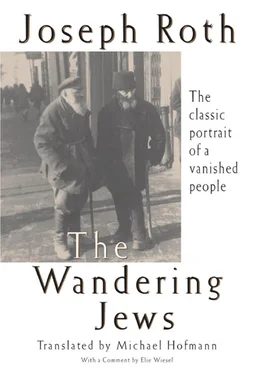7.
If an Eastern Jew has money and a lot of luck, he may be able, under certain circumstances, to purchase a “concession” and open a shop. It will be patronized by the poor people of the district. For instance the tailor described above. He wouldn’t pay cash, he would receive credit. That’s how an Eastern Jew “does business.”
There are Eastern Jewish intellectuals. Teachers, scribes, and so forth. And there are some who live on handouts. Shamefaced beggars. Panhandlers. Musicians. Newspaper vendors. Even bootblacks.
And so-called “air sellers.” Traders in “air goods.” The wares are at a station in Hungary somewhere. Or then again, perhaps not. But they are sold on the Franz Joseph Quay in Vienna.
There are Eastern Jewish swindlers and crooks. Yes, I said it: crooks! But then I have heard there are Western European crooks, too.
8.
The two principal streets of Leopoldstadt are the Taborstrasse and the Praterstrasse. The Praterstrasse is almost elegant. It leads to the Prater and pleasure. It is peopled by Jews and Christians. It is smooth, wide, and bright. There are plenty of cafés on it.
There are a lot of cafés on the Taborstrasse too. They are Jewish cafés. Their owners are largely Jewish, their clientele is Jewish almost to a man. Jews like to go to cafés to read the paper, to play tarock and chess, to do deals.
Jews are gifted chess players. Sometimes they play against Christian opponents. A good Christian chess player is not likely to be an anti-Semite.
There are many standing customers in Jewish cafés. They are a “casual public” in the true sense. They are regulars without taking food or drink there. They will drop into a café eighteen times a morning. They have to, for business.
They make a lot of noise. Their voices are loud and penetrating and uninhibited. Because all the customers are well-mannered and cosmopolitan, no one attracts special attention, though they are all striking enough.
In a true Jewish café you can walk in with your head under your arm and no one will notice.
9.
The war caused a lot of Jewish refugees to come to Vienna. For as long as their homelands were occupied, they were entitled to “support.” Not that money was sent to them where they were. They had to stand in line for it on the coldest winter days, and into the night. All of them: old people, invalids, women, and children.
They took to smuggling. They brought flour, meat, and eggs from Hungary. They were locked up in Hungary for buying up foodstocks. They were locked up in Austria for importing unrationed foodstuffs. They made life easier for the Viennese. They were locked up for it.
When the war was over, they were repatriated, sometimes forcibly. A Social Democratic provincial governor had them thrown out. To Christian Socialists, they are Jews. To German nationalists, they are Semitic. To Social Democrats, they are unproductive elements.
What they are is out-of-work proletarians. A peddler is a member of the proletariat.
If he’s not allowed to work with his hands, he works with his feet. It’s not his fault if he can’t find a better job. What’s the use of all these truisms? Who believes truisms anyway?
BERLIN
1.
No Eastern Jew goes to Berlin voluntarily. Who in all the world goes to Berlin voluntarily?
Berlin is a point of transit, where, given compelling reasons, one may end up staying longer. Berlin has no ghetto. It has a Jewish district. This is where emigrants come who want to get to America via Hamburg or Amsterdam. This is where they often get stuck. They haven’t enough money. Or their papers are not in order.
(Again: papers! Half a Jew’s life is consumed by the futile battle with papers.)
The Eastern Jews who come to Berlin are often on a transit visa that allows them to stay in Germany for two to three days. There are quite a few who came on a transit visa, and end up staying in Berlin for two or three years.
Berlin has long-established Eastern Jews, who generally arrived before the War. Their relatives came after them. Refugees from the occupied lands came to Berlin. Jews who had served in the German armies of occupation in Russia, Ukraine, Poland, and Lithuania had to return to Germany with the German army.
There are Eastern Jewish criminals in Berlin as well. Pickpockets, bigamists and con artists, counterfeiters, racketeers. Hardly any burglars. No violent criminals, no murderers.
The struggle for papers, the struggle against papers, is something an Eastern Jew gets free of only if he uses criminal methods to take on society. The Eastern Jewish criminal was generally a criminal in his past life. He gets to Germany on false papers, or with none at all. He doesn’t register with the police.
Only the honest Eastern Jew — honest and timorous — registers with the police. It’s much more difficult in Prussia than in Austria. The Berlin police like to undertake house-to-house searches. They check papers on the streets as well. They did a lot of that during the Inflation.
The trade in secondhand clothes is not prohibited, but it’s not sanctioned either. No one without a hawker’s license is allowed to buy my old trousers. Or sell them, for that matter.
But buy them he does. And sells them too. He stands on the Joachimsthaler Strasse, or on the corner of Joachimsthaler and the Kurfürstendamm, pretending to mind his own business. He has to be able to tell from the look of a passerby, first, whether he has old clothes to sell, and second, if he needs money.
Whatever clothes he manages to buy, he sells the next morning at the old-clothes exchange.
There are distinctions among hawkers too. There are rich and powerful hawkers, to whom the little ones look up shyly and humbly. The more money a hawker has, the more he earns. He doesn’t go out on the street himself anymore. He doesn’t need to. I’m not even sure whether it is still appropriate to refer to him as a “hawker.” In fact he has a secondhand clothes shop and a business license. The license is not in his own name but that of someone settled in Berlin, a solid citizen who doesn’t know anything about clothes but takes a cut from the business all the same.
The clothing exchange is where the hawkers and shop owners do business in the mornings. The former bring along yesterday’s crop of old dresses and jackets. In spring, light garments and sporty clothes are at a premium. In autumn, it’s tailcoats, dinner jackets, and striped trousers. Anyone who comes along with linen suits and summer clothes in the autumn is in the wrong business.
The clothes that the hawker has bought from passersby for pathetic sums are sold to the shopkeeper at a ridiculous markup. The shopkeeper then has them pressed and mended, and generally “freshened up.” Then he hangs them outside his shop to flutter in the breeze.
Anyone who is good at selling old clothes will soon graduate to selling new clothes. He will go from a shop to a fashion store. Someday, he will have his own department store.
It is possible for a hawker to make a career in Berlin. He will assimilate faster there than his equivalent would in Vienna. Berlin levels out differences and kills off particularities. Hence the lack of a Jewish ghetto there.
There are just a couple of small Jewish streets around the Warschauer Brücke and in the Scheunenviertel. The most Jewish street in Berlin is the melancholy Hirtenstrasse.
2.
The Hirtenstrasse is the saddest street in the world. It doesn’t even have the unreflective joy of real dirt.
The Hirtenstrasse is a Berlin street, softened perhaps by its Eastern Jewish inhabitants, but fundamentally unchanged. It has no streetcar line, no buses, only rarely an automobile; mostly just trucks, carts, the most functional and plebeian of conveyances. There are little hole-in-the-wall bars. You climb a few steps to reach them. Narrow, filthy, worn-out steps. The step equivalent of down-at-heel shoes. Rubbish is piled up in the doorways of houses. Sometimes this rubbish is collectible, even marketable. Rubbish as stock-in-trade. Old newspapers. Torn stockings. Widowed soles. Shoelaces. Apron strings. The Hirtenstrasse is drab like a slum. It lacks the character of a street in a shtetl. It has a new, cheap, already-used-up, bargain-basement quality. A street out of a department store. A cheap department store. It has one or two dirty window displays. Jewish bakeries, poppyseed cakes, rolls, rye loaves. An oil canister, sweating flypaper.
Читать дальше












